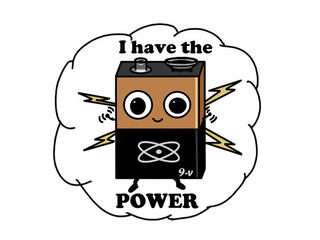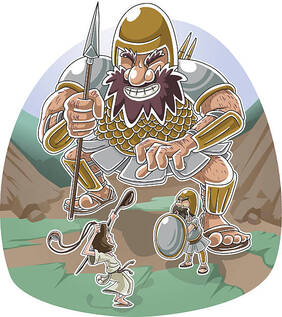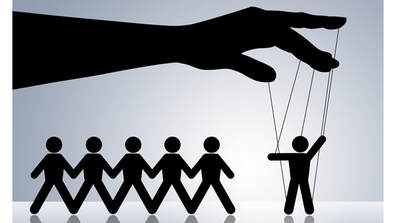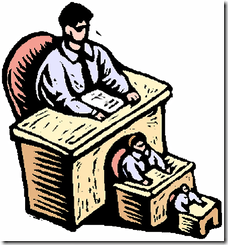 In last week’s blog I discussed what made up a culture, because it is so important when it comes to anchoring both your fictional world and also your fictional characters. In several places I used the word “power” as something that was needed to exert control. Who holds power and how they use it is an important part of culture as it shapes the way people behave, which is why culture is important in a novel. Understanding power is also very important in developing characters and plot, as I hope to demonstrate. Give the right characters the right levels of power in the right form and at the right time, you can do anything in a plot. A lot of that power isn’t actually held by the protagonist or antagonist, it is held by other characters, which makes for a more complex, and therefore more satisfying, plot.  Is your protagonist powerless? Is your protagonist powerless? However, this makes it sound as though there is only one sort of power. It is clearly visible in an antagonist, who arrays all sorts of powerful forces in order to frustrate the protagonist. However, this would suggest that the protagonist has no power of their own. If that were true, then the protagonist could never come out on top in a novel. In order to overcome power, the protagonist must have at least the same level of power. Either that, or they must be able to strip the antagonist of their power, in order to provide an equal “match up”. This can be seen in Lord of the Rings, where Frodo’s allies keep the Dark Lord diverted, concentrating on battles further away, while Frodo and Sam sneak into Mordor by the back door. They use alliances to create a large enough power base to take on Sauron. Stripping power away from the antagonist by a weaker force is demonstrated in two films. The first is Star Wars, where a single X Wing fighter destroys the Death Star. The same trope is used in Independence Day when Will Smith and Jeff Goldblum plant a nuclear device inside the aliens’ mothership, robbing them of their defences.  What sort of power did David use to slay Goliath? What sort of power did David use to slay Goliath? Both these acts render the antagonist(s) powerless, allowing the protagonists to triumph. Both of those are really David and Goliath stories told a different way. But when he accepted the challenge of Goliath, David knew something that Goliath didn’t. He knew he possessed “expert power” (see below). And if you think that power games are only the tools of action adventure novelists, then think again. It requires power of some sort to thwart the lovers in a romance. It just isn’t the sort of power that comes from the barrel of a gun (well, not usually). So, what sort of power can the author use to win the conflicts into which we send our protagonists? Studies of power structures have been carried out in business so that they can be understood. But don’t assume that they only apply to business. Businesses are made up of people and power is only of use if it can be used to control or influence people. Politics works pretty much the same way and if you belong to any sort of organisational structure, right down to the village darts team, you will encounter some sort power being used to some degree.  The fact that you don’t always see that power being wielded is a mark of how subtle its use can sometimes be. You don’t always have to plant a nuclear device in an alien spaceship in order to wield power. What types of power are there? Amarjit Singh PEng F.ASCE published a paper in 2009 which analysed this question, drawing on the findings of several other researchers. He studied several sources of power.  First we have legitimate power, aka positional power. This is power that “comes with the territory”. A Prime Minister or President will wield that sort of power, as will the CEO of a company. This is the sort of power that we are familiar with, because even the Evil Emperor will regard their power as being legitimate. After all, there is no one (they think) that can deny them their power. Crime bosses exercise what they regard as legitimate power, backing it up with violence and the use of weapons when needed. Just like Presidents or Prime Ministers who take their countries to war. The circumstances may be morally different, but the same sort of power is applied to make it happen. The police hold legitimate power, because they are established under laws passed by the government. However, they can also abuse the power invested in them. Within any organisation there are people who hold power. The amount of power may vary depending on their pay grade, but they all have it to some degree. Even the guy or gal on the production line has the power to bring it to halt if they walk off the job. So that one was easily dealt with.  Being able to bestow rewards is a source of power. Being able to bestow rewards is a source of power. Next we have “reward power”. Even a quite junior manager can exercise reward power, deciding who will receive bonuses, who will get a promotion and who won’t, right down to who gets the easy work and who gets to clean out the sewer. That sort of power makes sure people do what the manager wants them to do. A lot of this power is delegated from above, but it is something that can be used or abused. But ordinary members of the public also use reward power. We tip waiters and cab drivers for good service – and they know that if they do a good job they’ll get their tip. (I know this is different in the USA where everyone gets a tip regardless of whether they provided good service, but I’m not in the USA). That means the customer holds the power to control their behaviour. We may offer a Maitre D a small bribe to find us a better table (or any table at all). We also use reward power when we decide to go back to the same restaurant because they provided good service or avoid a restaurant that gave bad service. We call this “consumer power” and we all have it to a certain degree. All we have to do is adapt the concept for our novels. The prospect of a reward can get people to do what we want in a story. Treasure Island is based on the idea that if the crew of the Hispaniola cross the world with Squire Trelawney, there will be a reward at the end of it, when the treasure is found. That is a clear use of reward power in a novel.  Coercive power is fairly self-explanatory. It is based on fear. “Do what I tell you, or it won’t go well for you”. This isn’t seen in the workplace as often as it used to be, employment tribunals have seen to that (in the UK anyway), but it is still found outside the workplace. The coercion doesn’t just have to involve the threat of violence. Blackmail is a form of coercion, as are threats of isolation from the group – what we call “Being sent to Coventry”. There are probably other forms of coercion you can think of. Moral blackmail - convincing people "it's the right thing to do" - is also a form of coercion. What some people think of as persuasion or influencing can also be interpreted as coercion if it is taken beyond certain ill-defined limits. And, of course, coercion is often seen in bad relationships.  In the land of the blind, the one eyed man (or woman) is King. This alludes to expert power. If you know something, or understand something, that nobody else knows or understands, it is a source of power. This is often seen in wage negotiations. Back in the 1970s and 80s IT experts could pretty much write their own salary cheques, because so few businesses knew how to use computers. Today, however, that knowledge is commonplace and IT wage levels aren’t as generous as they once were. So expert power isn't always permanent. In fiction, we often make our protagonists experts in some field or another. Robert Langdon, the protagonist in the Da Vinci Code, is an expert in symbology. Tom Clancy’s protagonist Jack Ryan started out as an expert in interpreting military intelligence. Both are ordinary people at heart but become powerful through their application knowledge. In Lee Child's "Jack Reacher" novels, Jack is an expert in many fields. Even if we don’t make the protagonist an expert like Robert Langdon, we will give them special skills that they can use, such as being experts at unarmed combat. That is a source of power when they get into a fight and allows them to win. As mentioned much earlier in this blog, David had expert power which he used to defeat Goliath. He was an expert in the use of a slingshot, which negated Goliath’s size and strength. In cosy crime novels, amateur detectives outshine their professional counterparts by applying their expertise to solve crimes. Because they aren’t hide-bound by procedure, they can let their expert knowledge take them in directions the professional couldn’t or wouldn’t consider (at least, as far as fiction is concerned they wouldn’t consider). But in the end the amateur still requires the legitimate power of the police to make the actual arrest. So, you have two sources of power working within one book. If the murderer is also an expert in poisons, that is another source of expert power – which gives them the power to commit murder.  Charisma is a source of power. Its proper name is “referent power”. We often hear of charismatic leaders. We might also say that people admire or worship them. We see this a lot with celebrities, who use their referent power to become rich. Its basis is entirely due to how one person views another. If you don’t regard a person as charismatic (like a few politicians I could name), you won’t fall under their influence. People are drawn to charismatic people and are happy to help them. Charismatic people are therefore able to use that as a source of power, using their admirers to do their bidding. The only difference between the charismatic protagonist and the charismatic antagonist is what they ask their admirers to do. Robin Hood is probably the best known charismatic protagonist (if you are religious, it may be Jesus or Mohammed). In romance a common trope is the charismatic person who holds one of the star-crossed lovers in thrall. One way that charismatic power can be thwarted is to expose a character defect that hasn’t previously been visible, such as a cruel streak. It breaks the spell and sends the lover back to the one he/she should really be with.  You scratch my back and I’ll scratch yours, is otherwise called “reciprocal power”. It can also be called “resource power” as it usually involves a trading of resources. It requires both characters to have something that the other character needs. How valuable the resources are will influence the balance of power. In this case valuable doesn’t refer to intrinsic value, it refers to how much the character needs the resource. If you have the gun I need in order to go after the antagonist, I might be quite generous in what I offer in exchange. But the resource doesn't have to be physical. Politicians, for example, trade favours in order to gain support and to form alliances. In LOTR each of the fellowship has something that Frodo needs to help him get to Mordor. The most obvious is the magic wielded by Gandalf, but Frodo would have been helpless in the caverns of Moria without Gimli's knowledge. Aragorn is the King behind whom men rally. Even Sam Gamgee has something that Frodo needs – his bravery, steadfastness and determination. Without Sam, Frodo would never have made it into Mordor. And, in exchange for the resources that each of the fellowship provides, Frodo does the dirty work for them and carries the ring. There is even a conference at Rivendell where the negotiations are held, though it isn’t depicted as a negotiation.  What sort of power do you have? What sort of power do you have? So, as you can see, power isn’t something that is one sided. In addition, the sum of the power that the protagonist can bring to bear must be at least equal, if not greater, than the power of the antagonist. Either that, or you have to find a way of stripping the antagonist of their power. James Bond has to kill a lot of henchmen before he can go mano y mano with the villain, which is no different than getting a nuclear device onto an alien mothership. As an exercise, you might want to analyse the sort of power you are able to wield in different circumstances. For example, how much legitimate power do you have? How much resource power? How much reward power and how much referent power? If you are the only person in your place of work who knows how to use the photocopier, you have "expert power" - at least until someone else reads the user manual. Although we might not always feel it, we are all able to use power at some time in our lives, even if it is only every few years at the ballot box. If you have enjoyed this blog, or found it informative, then make sure you don’t miss future editions. Just click on the button below to sign up for our newsletter. We’ll even send you a free ebook for doing so.
0 Comments
Leave a Reply. |
AuthorThis blog is compiled and curated by the Selfishgenie publishing team. Archives
June 2025
|
 RSS Feed
RSS Feed